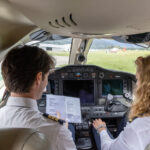Pilots may be fudging their pilot medical details
A pilot medical is the golden ticket to an amazing, lucrative, decades-long career in aviation. No wonder we protect it at all costs. But do we lie about our health to get a freshly signed copy of that precious piece of paper? A University of North Dakota (UND) study says yes.
The National Business Aviation Association (NBAA) is reaching out to its members to ask for participation in a groundbreaking study about airmen’s knowledge of healthcare services. The study was created by the University of North Dakota (UND) as a follow-on to a previous study that asked pilots about withholding information during medical exams in an effort to maintain their flying privileges.
According to NBAA, in the original study, 56% of pilots admitted “some form of healthcare avoidance to protect their ability to operate aircraft.” That’s a significant percentage – over half of the participating pilots say they’ve under-reported health issues. The new study is an attempt by the University to discover whether a lack of knowledge about healthcare practices is the reason why pilots are not reporting certain medical conditions.
Most importantly, UND is trying to determine if the knowledge about healthcare services (or the lack of knowledge) could be impacting flight safety. There is no question that safety is at the heart of the aviation industry and that the health of our pilots top the list of concerns that may adversely affect the safe operation of the aircraft. With the information gathered from both studies, we may be on our way to a better understanding of safety issues.
Significant progress has already been made on the perception of both the physical AND mental well-being of the flight crew and how it affects performance, but much more work needs to be done. It may be next to impossible to hide a broken leg, diabetes, or a heart procedure, but mental health is a whole different story. Yet mental health issues may have an even greater impact on the safety of a flight than any of those physical ailments. Being distracted because of a fight at home, suffering from financial distress, caring for a sick child or parent….it all takes away from the mental capacity needed to make safe and timely decisions in flight.
Why Honesty and Transparency Matter
Honesty and transparency are crucial for pilots when applying for a medical certificate. Not disclosing relevant medical conditions or medications can have severe consequences, including accidents, injuries, and fatalities. By being truthful and transparent, pilots enable the FAA to make accurate risk assessments and fulfill their ethical responsibilities to ensure the safety of all involved in aviation. Here are some reasons why honesty and transparency matter for you pilot medical:
- Non-disclosure can have damaging effects: Failing to disclose relevant medical conditions or medications can have severe consequences for both the pilot and passengers. If a medical emergency arises during flight due to undisclosed medical issues, it can lead to accidents, injuries, or even fatalities.
- Accurate risk assessment: Honest disclosure of medical conditions and medications allows the FAA to make an accurate assessment of the pilot’s ability to operate an aircraft safely. Non-disclosure can lead to inaccurate assessments, which could result in unnecessary risks.
- Ethical responsibilities: Pilots have an ethical responsibility to ensure the safety of themselves, their passengers, and other individuals involved in aviation. Failing to disclose relevant medical conditions or medications would violate this responsibility.
- Examples of significance: A pilot who fails to disclose a history of seizures could experience an episode while flying, causing a potential crash. In another scenario, a pilot taking medication for depression but failing to disclose it could potentially cause impairment mid-flight, leading to an accident.
- Implications of dishonesty: Dishonesty in the medical certification process could result in suspension, revocation, or denial of the medical certificate, which could lead to the loss of a pilot’s livelihood.
The NBAA’s study about health system knowledge may help the FAA determine new policies regarding medical requirements, including both mental and physical issues. At the very least, it will help them understand how mental and physical health impact aviation operations.
Getting Involved in the Study
The NBAA says the study should take between 5 and 10 minutes and does not ask for any identifying information. All responses are confidential and will have no effect whatsoever on your pilot medical status. Participation in the study is simply a way to add your input to a very important and timely topic of conversation taking place within the aviation community. The study can be found at the following link.










